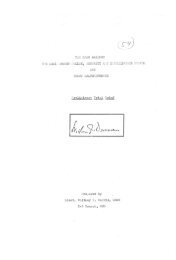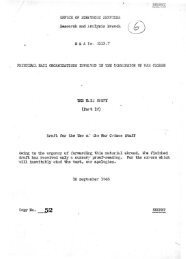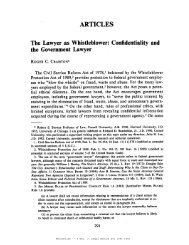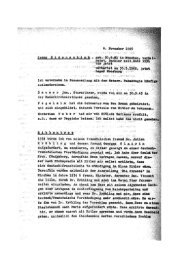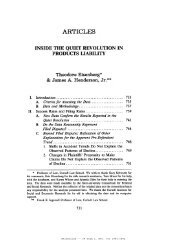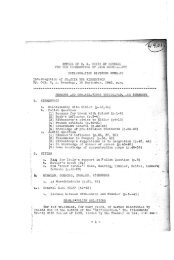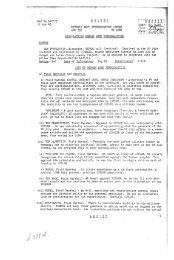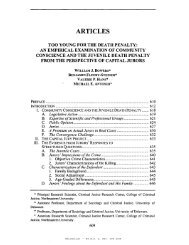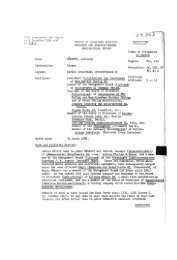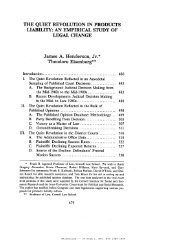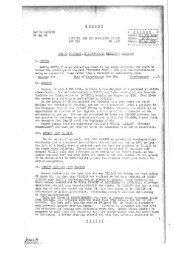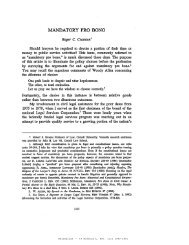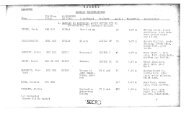Interrogation by Capt. 0. N. Nordon Present - Cornell Law Library
Interrogation by Capt. 0. N. Nordon Present - Cornell Law Library
Interrogation by Capt. 0. N. Nordon Present - Cornell Law Library
Create successful ePaper yourself
Turn your PDF publications into a flip-book with our unique Google optimized e-Paper software.
<strong>Interrogation</strong> <strong>by</strong> <strong>Capt</strong>. <strong>0.</strong> N. <strong>Nordon</strong><br />
<strong>Present</strong>: Dr. Josef Müller<br />
6 November 1945<br />
Georg Sidenschink, born 30 August 1901 in Munich; married; banker<br />
from the end of 1931 to the present; arrested<br />
30 May 1945; now in Camp Moosburg.<br />
I made frequent trips into foreign countries in connection with<br />
the Austrian tobacco industry.<br />
Däuser Jr., a Storm Troop Leader (Sturmführer), was seen <strong>by</strong> me<br />
on 30 May 1945 in the Mauerkirchnerstrasse.<br />
Fegelein married Eva Braun's sister under the illusion that this<br />
would bring him special advantages from Hitler.<br />
Christian Weber told me about Hitler's sadism, e.g. that he<br />
chewed carpets. I myself did not see that.<br />
RIBBSNTRQP. In 1934 I was asked <strong>by</strong> my French friend, Dr. Julien<br />
Krähling, and <strong>by</strong> his friend, Georges Clairin, to sound out Hitler<br />
as to whether he was inclined to arrange for an understanding be<br />
tween Germany and France. By way of Gauleiter Koch of Koenigsberg<br />
I then had Hess asked about this matter; he, after speaking to Hitler,<br />
told me himself that Hitler was in favor of an understanding between<br />
Germany and France. Thereupon, in 1934» on the occasion of the<br />
exhibition "The Street" in Munich, six French Ministers, among them<br />
Dan. Vincent from Lille, were invited <strong>by</strong> Dr. Krähling and me to the<br />
Hotel Vier Jahreszeiten. In the evening, Hess, with his liaison<br />
officer (Adjutant) Leitgen or Leitgens, came .<strong>by</strong> special plane from<br />
the Party Convention (Reichsparteitag) and stated again, to Dr.<br />
Krähling and me, that an understanding between Germany and France was<br />
greatly to be desired. Dr. Krähling made the suggestion to him that<br />
he, Hess, be asked to pay an official visit to Paris. Hess then<br />
stated that he would have to 3peak to Hitler first, and would then let<br />
Dr. Krähling know. During dinner, various problems of a German-<br />
French economic understanding were discussed. The French gentlemen
heartily welcomed, in every way, an understanding with Germany. As<br />
a result of the discussion, a meeting in Badenweiler between Dr. Krähling<br />
and Georges Clairin on the one hand and Hess, Gauleiter Koch, and myself<br />
on the other hand was planned, at which the formalities of Hess's<br />
official visit.were to be arranged. In the meantime Hess delivered an<br />
address to the front soldiers (Frontkämpfer). This address had been<br />
agreed upon with Prime Minister Barthou, and in it Hess spoke literally<br />
the sentences that Barthou wished to hear in this address.<br />
The meeting in Badenweiler was agreed upon and the Frenchmen were<br />
expected. On the evening before, Koch and I were ordered to Hess at<br />
Freiburg, ca. 17 kilometers from Badenweiler. There Hess stated, on<br />
commission from Hitler, that he would not hold this conference, but<br />
that Hitler would send his special plenipotentiary (Sonderbevoll<br />
mächtigten), Herr von Ribbentrop, there <strong>by</strong> plane, who would make the<br />
arrangements for Hess. We objected that this would be very unpleasant,<br />
after Hess had set a time for this conference with Hitler's consent;<br />
Hess declared that he could not change that, for it was Ribbentrop<br />
who had induced Hitler to agree to this conference. The next morning<br />
Herr von Ribbentrop arrived in Freiburg in Hitler's aeroplane and went<br />
to the Hotel Römerbad, where he appeared in a brown shirt and black tie.<br />
Gauleiter Koch and I were present at the Hotel Römerbad. When I objected<br />
that Hessfc failure to appear was very unpleasant for us, Ribbentrop said<br />
that that could not be helped, "I have been determining foreign policy<br />
with Hitler since 1931." In the afternoon, Dr. Krähling and Georges<br />
Clairin represented the French at the conference. The Frenchmen were<br />
not very pleased to see Ribbentrop instead of Hess. Nevertheless the<br />
negotiations were conducted in such a way that an official visit <strong>by</strong><br />
Hess at Raris could be agreed upon. Everything would have gone off<br />
smoothly if the French had not requested at the conclusion, when the<br />
whole matter was being reiterated, that they be given as soon as pos<br />
sible Hess'5 acceptance of the arrangements. Whereupon Herr von<br />
Ribbentrop replied: "I can do that easily because I am meeting Minister<br />
Hess this evening in Freiburg.» When the French Jieard this, the whole<br />
affair was washed out as far as they were concerned; for first Ribben<br />
trop said that official business prevented Hess from coming, then told
the same Frenchmen that while we were negotiating in Badenweiler Hess<br />
was sitting in Freiburg, only 17 kilometers away. The French partici<br />
pants in all these conferences considered the question v/hether an<br />
autonomous Alsace-Lorraine might not be possible, with political con<br />
nections with France and economic connections with Germany. According<br />
to Hess is inquiries of Hitler, 1-J' :.. Hitler stated that he was not<br />
interested in that, he had no demands regarding boundaries in the West.<br />
Before the Saar plebiscite in 1934 I published in Paris, <strong>by</strong> way<br />
of Dr. Krähling, a newspaper named "La Presse," with which various well-<br />
known Frenchmen (e.g. Georges Suarez among others), who trere members of<br />
the Legion of Honor in France and had a reputation as French nationalists,<br />
were affiliated as collaborators. These men expressed in newspaper<br />
articles the wish for a German-French understanding. "La Presse" was<br />
financed <strong>by</strong> funds in the amount of 3 million marks that came from the<br />
Bank der Deutschen Arbeit in Berlin <strong>by</strong> way of Gauleiter Koch, on com<br />
mission from Hess. These funds were advanced <strong>by</strong> way of Switzerland<br />
through Johann Heinrich Frank, and then were paid back to Frank in<br />
Swiss francs through checks of the firm Dyckerhoff and Wittmann. The<br />
firm Dyckerhoff and Wittmann belonged to the DAF. I personally had<br />
difficulties in this matter, since it was carried on without author<br />
ization to deal in foreign currency (Devisengenehmigung), and Schacht<br />
personally, when he found out about it, wanted to withdraw permission<br />
to deal in foreign currency (Deviseneigenschaft) from the Bank der<br />
Deutschen Arbeit and my firm. The matter was settled on Hess's inter<br />
vention. In this matter no German received any foreign funds or money.<br />
The sole difficulty in the way of a German-French understanding<br />
was at first Barthou, the French Prime Minister at that time. Barthou<br />
achieved great prominence in esthetic and highly intellectual articles,<br />
but he personally led a depraved life. For example, he used to walk<br />
at.night through the streets of Paris, pick up prostitutes, ask them<br />
if they did not know him—he was the famous Barthou—and go to bed with<br />
them. During such affairs his inclinations were altogether perverse.<br />
He asked them to urinate on him, and demanded other such pleasantries.<br />
Authentic reports, and even photographs, of these scenes were available.<br />
Dr. Krähling told me that Frenchmen who were in favor of an understand<br />
ing (franz. verständnisbereite Personen) had intimated to Barthou that<br />
-3-
if he did not. cooperate they would compromise him. Barthou was later<br />
murdered.<br />
Naturally, "La Presse" could only exist on subsidies. After the<br />
Saar plebiscite no more money was given <strong>by</strong> Hess, so that the newspaper<br />
had to be liquidated and the money was lost. So far as I know, no<br />
French politician was paid from these funds.<br />
It had been provided that through an exchange agreement (<strong>by</strong> way<br />
of a financial syndicate /BörsensyndikatT),Saar coal for French grain,<br />
Laval and Flandin should receive money. Darre* was not asked about<br />
this and therefore destroyed the entire exchange agreement. It was<br />
a question here of sums in the amount of several million francs.<br />
The fact that after the Saar plebiscite Germany gave no more<br />
money for the newspaper convinced me absolutely that Hitler was not<br />
concerned with a German-French understanding but was concerned only<br />
with assuring the incorporation of the Saar into Germany.<br />
Proof: immediately after the Saar plebiscite the German<br />
money-givers lost all interest in the newspaper;<br />
the newspaper was liquidated.<br />
Originally Ribbentrop's only connection in France was Daladier.<br />
Ribbentrop saw to it jealously that no one else had connections in<br />
France. Therefore I, also, with my friends in Paris, was excluded.<br />
Dr. Julien Krähling comes from Catholic circles; he is a<br />
lajiyer. Dr. Krähling worked during the war against Hitler. Dr. Kräh<br />
ling wished originally to bring about a European understanding.<br />
When he saw that this could not be effectuated, he worked against<br />
Hitler. He was defense counsel for almost all the prominent Frenchmen<br />
before the German Court Martial (Kriegsgericht), and he repeatedly<br />
induced mp. personally to intervene through Rattenhuber. Thus, for<br />
example, Count de Vogue, of Epernay, was condemned to death; after<br />
intervention the sentence was commuted.<br />
Dr. KEähling was a close collaborator with the people associated<br />
with the banking house Worms & Co. in Paris, whose exponent (Exponent)<br />
is the plenipotentiary general (Generalbevollmächtigter) Gabriel le<br />
Roy-Ladurie, who cooperated closely with the Americans.<br />
• * -
HESS and BORMANN. In Munich Hess was regarded as the guarantor of<br />
orderliness within the Party. He was the only one who argued with<br />
the Führer. Hess was pushed entirely to one side <strong>by</strong> Bormann.<br />
Reichsleiter BUCH (Bormann's father-in-law) said to me, "Martin<br />
Bormann is not entirely innocent in the matter of Hess's flight."<br />
At the beginning of the war, Hess was shoved aside from Hitler <strong>by</strong><br />
Bormann. Eidenschink believes that Hess really desired peace.<br />
/sic, -translator/<br />
LEITGENS, Goring's/adjutant, may know why Hess fled to England;<br />
Frau Hess would know it, too, also possibly Edgar Horn, stepbrother<br />
of Frau Hess. Likewise, General Haushofer. Hess may have done business<br />
through the banking house Georg GÖTZ (proprietor Seyrich ?). This<br />
banking house must also have had Party funds. When Hess was still in<br />
office (from 1936 on) he visited the doctor. Hess was a family man<br />
with no outside interests.<br />
I spoke with Hess once in Berlin, at the Hotel Kaiserhof, and<br />
once in Munich, at the Hotel Vier Jahreszeiten.<br />
Hess was a friend of Scapini, blind deputy (Deputierter), with<br />
whom he went to school in Petersberg a. Rhein. The only man to whom<br />
Hess revealed himself was his adjutant, Leitgens. Hess was very<br />
reserved. Hess was a flier and skier, on the whole a cultured man,<br />
had good manners and liked to.read. He was the only well educated<br />
man in Hitler's circle. Hess is a dreamer. The day before he fled<br />
I saw him walking with his sheep-dog in front of his villa. I only<br />
greeted him. He appeared very taciturn and disturbed. In conversa<br />
tion he was matter-of-fact and did not talk around the point.<br />
BORMANN. I first saw him in 1927 at a carnival ball; the last time<br />
I saw him was in 1935- In 1927 he went from Thuringia to Munich, where<br />
he engaged in farming, but then went away following some awkward affair.<br />
Banker WITZIG and his friend MIEDEL took his part and helped him, also,<br />
during his illness (appendectomy).<br />
Bormann seduced the daughter of Major Buch and had to marry her<br />
because she was with child. At first he had a small job with the<br />
NSDAP Relief Fund (Hilfskasse), then gained access to Hess through<br />
his father-in-law. Bormann had gambled away his mother's money on<br />
-5-
the stock exchange. Witzig paid his debts and furnished him clothing.<br />
PIETZSCH, HESS'S economic adviser, an open and upright man, did not<br />
like Bormann. Through Keppler and Kranefuss, Bormann had Pietzsch<br />
set aside. He also managed to shoulder out Hess. Bormann had a most<br />
harmful influence on Hitler. He watched over him jealously, so that<br />
no one would be admitted to Hitler who might tell him the truth.<br />
I talked with Bormann four or five times. Bormann was hostile to me be<br />
cause I had gone to Hess without his permission. Pietzsch wanted to<br />
talk to Hitler at Qbersalzberg. But Bormann prevented that. Frau<br />
Pietzsch told me that she was sure Hitler was not normal. Frau<br />
Pietzsch was persoaally well acquainted with Hitler. Herr Albert<br />
Pietzsch and his brother, Baurat Pietzsch (not a Party member) were<br />
the first to finance Hitler. To the best of my knowledge, it was .<br />
Pietzsch who took Hitler in his car from Landsberg after, the putsch.<br />
Every Christmas Bormann presented Hitler with a child. Bormann<br />
had several female friends, among them one from the Metropol Theater<br />
in Berlin, supposedly named Schneider.<br />
Hermann FEGELEIN was kicked out of the State Police. His father was<br />
at first against Hitler. Eegelein tried to affiliate with the SS and,<br />
with the assistance of Christian WEBER, finally joined it. Later<br />
Fegelein was hostile to Weber. Fegelein made large black market profits<br />
in Warsaw with furs and diamonds.<br />
Major Fritz WALSER, formerly director of insurance with the<br />
Allianz, then Major in counterintelligence, now at Camp Moosburg, may<br />
be questioned concerning Fegelein. (Walter was very closely connected<br />
with WARLIMONT) After the 20th of July, Walter was imprisoned <strong>by</strong> the<br />
Gestapo.<br />
Fegelein offered to procure a fur for Walter's wife.<br />
After the Polish campaign, Hitler declared at a dinner in Warsaw<br />
that gold and diamonds could be bought only against scrap materials.<br />
Thereupon, HOFFMANN immediately want to Berlin and made purchases.<br />
SCHAUPP, who was not involved in this affair, betrayed the whole<br />
affair to Hitler.<br />
Fegelein received the Ritterkreuz as a result of the corruption.<br />
He married the sister of Eva Braun and so became, along with Bormann,<br />
-6-
the most influential man at Obersalzberg.<br />
Relations between Bormann and Himmler were strained.<br />
Schellenberg was, in effect, the successor of Canaris. Schellen<br />
berg was Himmler 1 s man.<br />
BORMANN's personal vice was women. Major Buch threw his son-in-<br />
law out on account of his moral depravity. Bormann practically re<br />
duced his father-in-law, as Party judge, to a position of helplessness.<br />
SCHNEIDER, of the Supreme Party Court, must know where the files<br />
of that tribunal are located.<br />
Christian WEBER said one day: Bormann is the grave-digger of<br />
the German people. Rattenhuber can verify this.<br />
Fegelein's marriage took place at the Obersalzberg. Hitler himself<br />
waa host. Ehe wedding celebration was- held-.ihoBormann's home and turned<br />
into rather an orgy. Bormann's banker was probably Götz, Bankhaus,<br />
Karolinenplatz, Munich.<br />
MIEDEL, Alois, banker from Munich; address of mother: Munich,<br />
Frühlingstrasse.<br />
About 40 years old, now very likely in Spain with Hitler's approval.<br />
Miedel served his apprenticeship with the firm of Heinrich and Hugo<br />
Marx. At 19 years of age he was already a stock broker. Through Witzig<br />
and with him and Dr. Erhard, Miedel bought up the majority of shares in<br />
the firm Schantung A.G., in Berlin. The Schantung A.G. possessed<br />
several million marks in Reich Treasury notes, which he sold at un<br />
favorable exchange rates in order to have money for the Witzig bank.<br />
He explained that he did this on the advice of the then Minister of<br />
Finance, Dietrich. Miedel used these monies for his own ends.<br />
I have known Miedel since 1920 and last saw him about two years<br />
ago in Berlin (about 1943/44)• Until 1932, I saw him almost daily at<br />
the stock exchange. We are business acquaintances. I have always tried<br />
to assist him. In 1932 Miedel found a gap in the foreign currency<br />
regulations. He bought a chest of diamonds at the Russian Embassy in<br />
Berlin and took it <strong>by</strong> plane to Switzerland or Holland. In Holland he<br />
established a firm which was called "Impex" at first and which was<br />
a subsidiary of Fa. Schantung (import and export). Through the sale<br />
of diamonds he covered his debts in Germany. Miedel is a child of<br />
^Y»»
nature with definitely good ideas, but he was always on the borderline<br />
sf legality. He was much inclined to play politics. In Amsterdam<br />
he lived at Römer Fischerstrasse 23. I visitedhim there once. His<br />
wife, whose maiden name was Fleischmann, was older than he.<br />
Miedel smoked and drank heavily and was addicted to women.<br />
Miedel managed, a certain Fa. Atmos A.G. in Zurich, which belonged<br />
to the Heizkessel Schmid in Kassel.<br />
In 1931/32, Miedel approached Hitler through FUNK and on the occasion<br />
of a visit to Obersalzberg gave Hitler a speech on Germany's economic<br />
possibilities.<br />
In consequence of his profiteering with diamonds, he became subject<br />
to prosecution under the foreign exchange laws and could not return to<br />
Germany. He tried to find entree into the Hitler regime and negotiated<br />
repeatedly with Keppler in Rome, but failed to make connections in this<br />
way.<br />
I was in Holland in 1933 and was trying to raise funds for industry.<br />
In the course of this, I encountered Miedel. He asked me to intervene<br />
in order that he might return to Germany. Through Rattenhuber I spoke<br />
to Himmler about Miedel. Kranefuss and Keppler did not want Miedel in<br />
Germany in the Führer's vicinity.<br />
Miedel made connections through Frau RIEGELE, Goring's sister,<br />
whose husband was notary in Linz. Frau Riegele is a considerably older<br />
woman, who was Miedel's mistress. She has great influence over Goring.<br />
The biggest of GSring's profiteering jobs were accomplished through her.<br />
Miedel also bought controlling interest in the Foto Schering-Kahlbaum<br />
A.G. This firm, Foto Schering, had American shares which Miedel sold<br />
to Americans for foreign currency and the money thus obtained he used<br />
for himself abroad. (Höglmeier, assistant manager of Fa. Witzig & Co.)<br />
Miedel received through Frau Riegele, from Goring, a blocked marks<br />
permit for 3-4 million RM. Brinkmann influenced von Reemtsma to try to<br />
prevent this profiteering in foreign currency, but Frau Riegele managed<br />
to carry it out with Goring's aid.<br />
Another racket: Miedel bought the Beutenlandsche Bank in Amsterdam.<br />
Through Frau Riegele he had got in close touch with Göring. Himmler<br />
tried to prevent the granting to Miedel of permission to return to<br />
-8-
Germany, but Goring was stronger and brought it about. When the invasion<br />
of Holland occurred, Miedel was arrested. Before the invasion, Miedel<br />
had had his director withdraw all the money from the bank (about 2 million<br />
Gulden). This director, too, was arrested and had to deposit the 2 million<br />
Gulden with the guard. When he was released, the 2 million Gulden were<br />
returned to him there. He turned them over to Miedel. In this way, Miedel<br />
had over 2 million Gulden in cash at his disposal, tfiereas at that time in<br />
Holland one could withdraw only very small sums of cash. Miedel went to<br />
the banker, Roblins Königs, Amsterdam, Herrengracht. The latter owned<br />
the most famous collection of Rubens paintings in Holland. Miedel proposed<br />
that Königs sell him the Rubens collection. Königs did not want to re<br />
linquish it. At first the negotiations were on a basis of from 2 to J>\<br />
million Gulden, but finally terms were agreed upon at 1^ million Gulden,<br />
with the proviso that the money be paid in case. Königs never believed<br />
that Miedel could raise the money. Miedel paid this 1^ million to Königs<br />
in cash and took possession of the paintings. In this way, Königs'<br />
Rubens collection changed hands and passed to Miedel. I have an idea that<br />
Hoffmann, too, had a part in this affair.<br />
The Fa. Kautstiker in Amsterdam—a famous art works concern—and a<br />
castle in Osterwik were bought <strong>by</strong> Miedel. Photographer Hoffmann had a<br />
hand in this art business deal. The affair of Fa. Kautstiker was an<br />
Aryanization racket and was the stepping-stone for the selling out of<br />
Dutch art to Germany. Goring and Hoffmann were participants in this<br />
racket. Hoffmann recommended to Hitler several pictures from the Fa. •<br />
Kautsticker. Hitler wanted to see these pictures in Berlin. Hitler<br />
wanted to buy only part of the pictures, but Hoffmann saw to it that all<br />
of them were purchased. Hoffmann had a hand in this particular business<br />
of Miedel's and in others of Miedel's deals. Miedel and Hoffmann gave<br />
Goring paintings as commission on these deals. Goring, in turn, presented<br />
many of the pictures to Gauleiters whom he wished to keep on his side<br />
(bribery). This was about 194<strong>0.</strong> Besides paintings, furniture, carpets<br />
and antiques were also taken from Holland through Miedel.<br />
KRANEFUSS is a nephew of Keppler. He was a bank official in the Etewish<br />
business of Gumpel in Hannover and had connections with the SS through the<br />
adjutants to the Reichsführer, Wolf and Keppler. It is supposed that<br />
-9-
Kranefuss and Wolf were homosexual. Kranefuss placed large sums of<br />
money from industry at Himmler»s disposal, eventually became economic<br />
adviser to Heydrich and Himmler. Kranefuss assisted Wolf financially<br />
and through the SS obtained the position of General Director of the<br />
Brabag (brown coal and benzine).<br />
KEPPLER became State Secretary in the Foreign Office. Keppler is a<br />
very inferior sort of man. He was always flaunting ibis good connections<br />
with America.<br />
Baron FEURI knows where Hans Buchner, Burghauptmann in Cracow, is.<br />
Philipp RF^MTSMA evaded the tax laws <strong>by</strong> giving large bribes of money to<br />
Goring and Shirach. He was a flyer in the World War. One generally<br />
spoke of the LEX-Reemtsma.<br />
The photographer HOFFMANN, father-in-law of Baldur von Schirach,<br />
was a go-between in this matter, too. He was nicknamed "Reich Drunkard."<br />
Through Goring, Reemtsma obtained the largest woodworking concern<br />
in Europe, in Turany, Slovakia.<br />
Cancelled excise tax debts of the Fa. Reemtsma to the Reich amounted<br />
to about 100 million. In this connection, the Reemtsma concern was given<br />
an opportunity to annex a number of smaller firms.<br />
In the LEX-Reemtsma affair, Heinrich Hoffmann was rewarded <strong>by</strong> a<br />
commission to make Hitler-portraits for the cigarette industry.<br />
BODENSCHATZ, the personal friend of Goring. Bodenschatz could be bribed.<br />
He was the go-between between industry and Goring. Clemens Auer (Köln)<br />
paid bribe money to Bodenschatz in return for Aryanization (Levi Concern<br />
in Strassburg).<br />
For further information about this: Dr. Schaudig in Regensburg.<br />
Re Four Year Plan Office; Director was first Councillor of State Kömer,<br />
then LANGE (ask Schniewind or Bayer).<br />
LANGE became vice-president of the Reichsbank through his relations with<br />
Goring and at the end of the war went around in Munich wearing the uniform<br />
of an Air Force officer. Shortly before the Americans marched in, he went<br />
to the Reichsbank in order to get a great part of the foreign currency<br />
assets in Munich, claiming that he wanted to finance the Werwolf.<br />
Shortly before the end of the war, deserving Party members and persons<br />
closely connected with them in economic life were given large quantities<br />
of : \ -10-
of diamonds and gold at ridiculously low cost.<br />
Ask: NECKERMANN, director of the Reich Textile Group.<br />
KARL, Anton, carried on the biggest illegal profiteering through the DAF<br />
in the years 1934-35-36 and paid large bribes to the SS Group Leader Wolf,<br />
and to Schaup, Hoffmann, and most likely to Esser, too. He had a certain<br />
Fa. Gustav Jaeckel, furniture concern, in Berlin near the Eden Hotel.<br />
Karl had fixed up a large house in Berlin as a love-nest for all the higher<br />
SS leaders in Berlin. Müller, of the Bank of German Labor in Berlin, was<br />
also a participant in this affair. Müller thought nothing could happen to<br />
him because he had paid very high bribes. When Karl was arrested, all the<br />
papers compromising the SS leaders were taken from his safe <strong>by</strong> the Gestapo<br />
and placed in safe-keeping. Karl was friendly with Wolf but was on bad<br />
terms with Stabsleiter Simon von Ley. I myself became acquainted with Karl<br />
through Schmidhuber. Karl was invited everywhere with Gauleiter Wagner and<br />
Schaup. Karl was a criminal offender wanted <strong>by</strong> the criminal police.<br />
Rackets were the prime source of his funds. Germann Böhm, Heinrich Hoffmann,<br />
Schaup, Sepp Dietrich and Wolf were involved in these rackets. Wolf con<br />
fessed his dealings with Karl to the Reichsführer, and Himmler saw to it<br />
that nothing happened to Wolf. The scandal concerning Karl finally became<br />
such a public annoyance that his commitment to a concentration camp in 1937<br />
could no longer be prevented. He was dangerous because he know too much.<br />
Karl is an opportunist.<br />
FUNK. The Reich Economic Chamber wanted to give him a painting worth from<br />
20 - 30,000 RM for his 50th birthday. But Runk suggested to Pietzsch that<br />
he be given an estate. This was originally supposed to cost 50 - 70,000 RM.<br />
Alterations and addition of land brought the price up to 1 million RM. After<br />
Pietzsch refused to undertake this, Gering said, never mind, he would pay<br />
for it.<br />
KOCH, Erich. Gauleiter in Königsberg, Party membership number 98, formerly<br />
railway official from Elberfeld; at the last, Chief for the Ukraine.<br />
Development of the Erich Koch Foundation, which was purportedly for<br />
the purpose of furnishing houses for old Party members. At the start of<br />
the war Koch declared that he would stand sponsor to the children of East<br />
Prussians who were killed in the war and would pay for their education.<br />
With Adolf Hitler's permission he created the Erich Koch Foundation. He<br />
-11-
applied the funds of this Foundation to his personal purposes, to the<br />
development, for instance, of the estate Gross Friedrichsberg, near<br />
Königsberg, supposedly for Adolf Hitler's guests. Also the completion<br />
of a big castle at Krasne, in Zichenau district, Poland (see below).<br />
Gflring - Darrg Aryanizations on a large scale<br />
Erich Koch a personal friend of Reich Bishop Müller and Field<br />
Marshal Blomberg, an opponent of Brauchitsch.<br />
Big fight between Goring and Koch, because he knew too much. Koch<br />
was removed from office as Oberpräsident of East Prussia. Hitler retained<br />
Koch as Gauleiter, so Goring ceremoniously reinstated him as Oberpräsident,<br />
praised him, etc.<br />
This castle had about $0 guest rooms with baths, etc. Goring was<br />
invited to a hunt. Three thousand Polish beaters were hired for a battue.<br />
For this important occasion all the telephone wires to Goring's head<br />
quarters had to be transferred to Krasne. Goring appeared in various<br />
costumes, e.g. a blue silk mantle with red scarf, in the scarf an emerald<br />
as big as one's thumb, and other ornaments. All this was told me <strong>by</strong> Koch.<br />
DIETRICH, Sepp, was formerly a filling station attendant with Christian<br />
Weber and was an SS Führer. He was one of Hitler's favorites. Hitler<br />
put him in charge of the Bodyguard (Leibstandarte). Dietrich lived in<br />
the Reich Chancellery, held wild parties with women and big drinking bouts.<br />
He received a large estate near Sarow. Sepp Dietrich was bribed with<br />
women. For these bribes he furnished connections with the various<br />
ministries which could grant concessions. Sepp Dietrich was also bribed<br />
<strong>by</strong> KARL. Shortly before the fall of Stalingrad, he dispatched from Paris<br />
the following message to Field Marshal Paulus: "Hold on, I am coming."<br />
Himmler was somewhat jealous of Dietrich. Dietrich was never capable of<br />
leading a troop. He was SS-Obergruppenführer, Corps Commandant. The<br />
Bodyguard was given the best arms and the best equipment in general.<br />
LEY. Stabsleiter Heinrich SIMON, arrested in the vicinity of Lake Constance<br />
(?), knows all about him. Simon hated Ley.<br />
LASCH was Governor in Warsaw, had an affair with Frank's wife. Had big<br />
black market dealings in diamonds and furs. Frank and Lasch talked against<br />
-12-
Himmler, whereupon Himmler caused their downfall. Lasch tried to help<br />
himself <strong>by</strong> mentioning his intimate relationship with Frau Frank. When<br />
Hitler learned of this, he only remarked that the man should be put out<br />
of the way. This was told me <strong>by</strong> Gauleiter Koch. Lasch was, in fact,<br />
liquidated.<br />
Baldur von SCHIRACH was homosexual and had as his friend a certain Hitler<br />
Youth leader named Müller.<br />
About HITLER, himself, the following can best furnish information:<br />
Hugo MÄNNER and Bertold Fischer. Fischer was imprisoned with Hitler at<br />
the Fortress. Hugo Männer can report, as an eye-witness, on Hitler's<br />
love life. Men say that Hitler was very unmanly and childish in his<br />
love life.<br />
According to men's testimony, Hitler fancied he was Frederick the Great<br />
Every General Field Marshal and General with special decorations was<br />
given es estate <strong>by</strong> Hitler (Brauchitsch, Rundstedt, Kesselring, Mannstein,<br />
Küchler, Lob; Halder received nonetiecause he was an opponent of Hitler).<br />
In about 1940/41 Gauleiter Koch said to me that the Generals would<br />
not be at the helm much longer, since in another year the SS would have<br />
progressed so far that the Generals would be powerless to do anything.<br />
RATTENHUBER is supposed-to have fallen into the hands of the Russians in<br />
front of the Reich Chancellery, severely wounded.<br />
Various persons in Hitler's Escort Detachment (Begleitkommando) are •<br />
in Moosburg, likewise the driver of Leader Erich Kemka. DIRR of the Escort<br />
Detachment, and others,<br />
The only one who might know whether Hitler is living is Rattenhuber.<br />
Jakob WERLIN, Mercedes Benz, at present in Camp Moosburg, one of Hitler's<br />
most intimate friends, should be questioned.<br />
-13-





